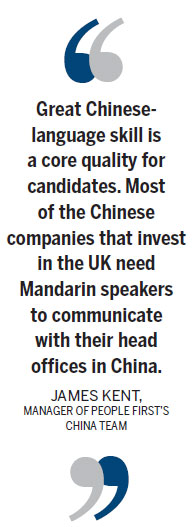Language opens doors in jobs market
Updated: 2015-06-05 05:58
By Meng Jing(China Daily Europe)
|
|||||||||||
Visa hurdle not necessarily detrimental to employment chances, experts say
Job seekers in Britain who have a Chinese background and are deterred by stricter immigration rules and the difficulty in gaining work permits are being offered some solace by the increasing activity of Chinese businesses in the country.
In fact, People First, a London recruitment agency, is looking to add another person to its team to cope with the booming demand for bilingual candidates in the UK.
|
Visitors at the British booth of the China International Education Exhibition Tour in Beijing. It is becoming easier for some Chinese, especially those with work experience, to find jobs in the UK as demand for Mandarin-speaking candidates grows. Photos provided to China Daily |
"Great Chinese-language skill is a core quality for candidates," says James Kent, manager of People First's China team, which aims to match Mandarin-speaking candidates with potential employers.
"Most of the Chinese companies that invest in the UK need Mandarin speakers to communicate with their head offices in China."
The company, founded in 1997 to help Japanese companies in the UK recruit Japanese speakers in London, says the demand by Chinese companies for Mandarin-speaking candidates is growing.
"In 2010 we received one China-related vacancy every two weeks, but now we receive about 3.8 new China-related vacancies every week on average," says Kent, who has been involved with China-related recruitment at People First since 2011.
Japanese recruitment is still the company's biggest business, but Kent says his China team is catching up very quickly. Last year the company received a record high of 137 China-related job orders, compared with 28 in 2010, he says.
"The increasing demand is in line with the increasing number of Chinese companies that are investing in the UK, and the growth of existing Chinese companies in the country."
Europe is into the sixth year of consistently high levels of Chinese outbound direct investment, which doubled to $18 billion (16.4 billion euros) last year compared with the year before, says a report by Baker & McKenzie, a multinational law firm founded in Chicago. Britain was the top destination for investment from China, attracting $5.1 billion last year, the report, issued in February, says.
About 80 percent of the China-related vacancies referred to People First are from Chinese state-owned enterprises and private companies, Kent says, and the rest are from non-Chinese firms in Britain.
Because most Chinese state-owned enterprises now have branches in London, Kent says, the growth prospects for his firm lie in the demand from Chinese private firms, which have just picked up momentum in using London as a base to grow in Europe.
"They need to recruit more and more staff to feed the growth."

However, the fact that there are more vacancies, thus more opportunities, for Mandarin-speaking job seekers, does not mean it is easy for Chinese to get work in Britain.
Kent says there are limits on even big Chinese and international companies in how many candidates they can sponsor.
"Because of that, we can only recruit people who have visas, spouse visa or Britain-born Chinese."
He predicts that with more Chinese companies setting up shop in Britain, the competition for the best talent among Chinese employers will become fierce.
"It is going to get to the stage that to get the best candidate they will have to provide sponsorship."
A woman who works in the human resources department of a Chinese property developer in Britain, and who does not want to be identified, says it is difficult to find suitable candidates.
"Though most of the Chinese companies can provide sponsorship for candidates who don't have a visa, it is very time consuming. You need to prove you have tried to recruit locally for the post and that there is no one suitable.
"More importantly, as a company that is expanding into Britain right now we want senior people with work experience rather than new graduates. We don't have the time and resources to train them."
Her company is in dire need of Mandarin speakers with work experience, especially in positions such as administration and accountancy, she says.
Her company, which entered Britain last year, plans to add 10 people to its staff of 30 this year, she says.
People First says Chinese people who have studied banking and finance are the candidates most in demand, although those with degrees in arts and science are also sought after.
Carrie Waley, chief executive officer of Mandarin Consulting of London, which provides career coaching that assists Chinese students and job seekers to obtain jobs and internships in international companies, says that despite difficulties for non-EU nationals in obtaining visas it is becoming easier for some to find jobs.
"I know of an international law firm in the UK that had 10 vacancies for mainland trainee lawyers last year but failed to fill them because of the lack of qualified candidates."
With strong business ties between China and the UK, there will be more and more opportunities for Chinese candidates, Waley says.
"But whether you land a job in the UK depends on the competence of candidates. (Companies) will not compromise their recruitment standards because of your nationality."
mengjing@chinadaily.com.cn
( China Daily European Weekly 06/05/2015 page8)
Today's Top News
65 bodies found, more than 370 still missing
Ex-FIFA executive detailed bribes in 2013 secret guilty plea
Beijing 'shocked' at Nazi comparison by Philippines
Ship disaster in Yangtze River: Roundup of updates
HK economy will suffer if reform fails, tycoon says
Blatter rocks world soccer by quitting FIFA amid scandal
Obama signs bill remaking NSA phone records program
China's Dalian Wanda buys Australian cinema chain Hoyts
Hot Topics
Lunar probe , China growth forecasts, Emission rules get tougher, China seen through 'colored lens', International board,
Editor's Picks

|

|

|

|

|

|







